Kazakhstan became a member of the United Nations on March 2, 1992. In 31 years, Kazakhstan has gone from joining the organization to chairing a session of the General Assembly. Over these decades, Kazakhstan has contributed to many aspects of the UN’s work across the globe. In this article, we look back at some of the key moments and initiatives of the Kazakhstan-UN cooperation.
31 years of partnership
Kazakhstan was unanimously admitted to the UN at the 46th session of the UN General Assembly on March 2, 1992. The accession marked the international recognition of state sovereignty and Kazakhstan’s independence.
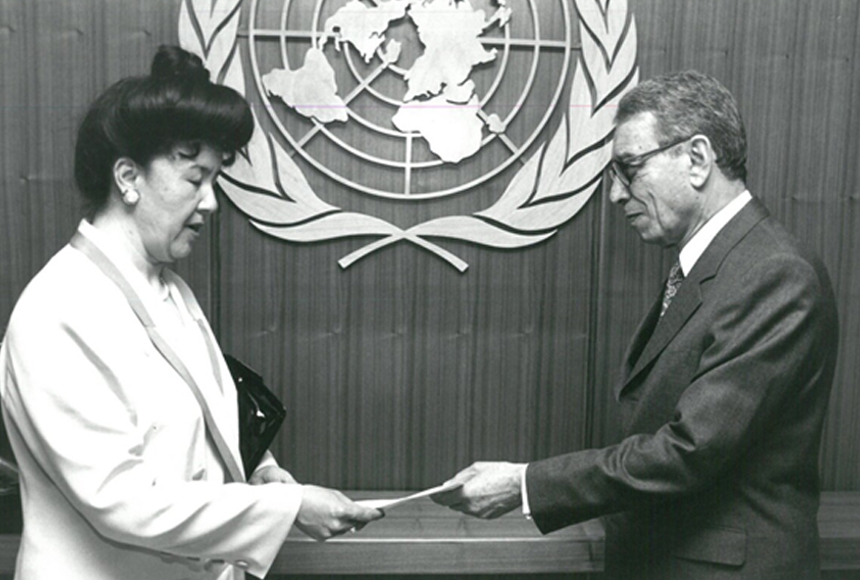
Akmaral Arystanbekova was appointed as the UN’s first Permanent Representative of Kazakhstan on April 15, 1992. Photo credit: e-history.kz.
Next month after accession, Akmaral Arystanbekova was appointed as the UN’s first Permanent Representative of Kazakhstan.
“From the first days of its membership in the UN, Kazakhstan took an active stance in addressing the most pressing international issues on the organization’s agenda. The voluntary renunciation of the world’s fourth-largest nuclear arsenal that we inherited, and the closure of the Semipalatinsk Test Site were highly appreciated by the UN for the contribution of the newly independent state to disarmament, strengthening the nuclear non-proliferation regime and eliminating nuclear testing on the planet,” Arystanbekova said.
The Permanent Mission of Kazakhstan to the UN was established in Almaty on Feb. 16, 1993. Since then, Kazakhstan has proposed several key initiatives.
Kazakhstan’s initiatives at the UN
One of the first international initiatives was to convene the Conference on Interaction and Confidence Building Measures in Asia (CICA) at the 47th session of the UN General Assembly in 1992. CICA now includes 28 member states, which account for almost 90 percent of the territory and population of Asia. The process of CICA’s transformation into a full-fledged and international organization was launched during the sixth summit of the group in Astana in 2022.
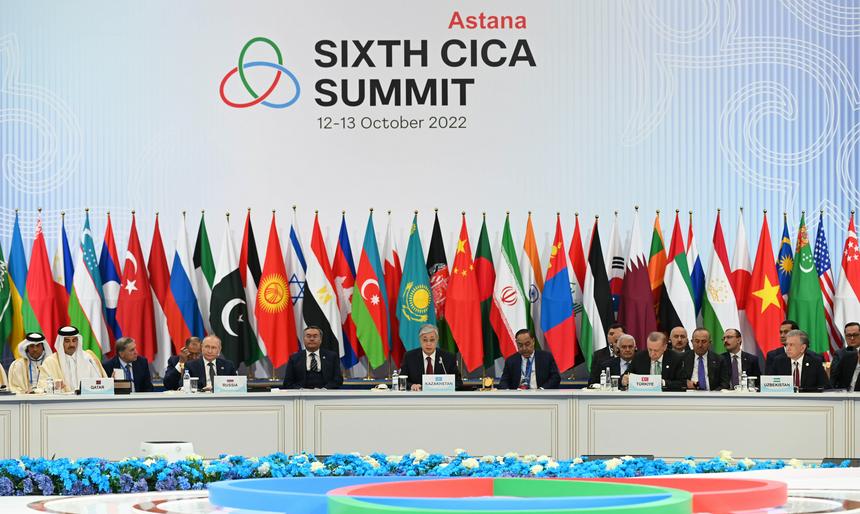
The Conference on Interaction and Confidence Building Measures in Asia (CICA) at the 47th session of the UN General Assembly in 1992. Photo credit: Akorda.kz.
The establishment of the UN Special Programme for the Economies of Central Asia (SPECA) is another major initiative of Kazakhstan.
The country also advocated for the creation of the Regional Centre for Preventive Diplomacy for Central Asia, which now operates in Ashgabat, Turkmenistan.
Together with its regional neighbors, Kazakhstan also co-founded the Nuclear-Weapon-Free Zone in Central Asia. Furthermore, at the initiative of Kazakhstan, the UN General Assembly approved the Universal Declaration on the Achievement of a Nuclear-Weapon-Free World in 2015. It was co-sponsored by 35 countries.
Aug. 29, the date the Semipalatinsk Test Site in Kazakhstan was closed, was unanimously proclaimed the International Day against Nuclear Tests by the General Assembly in December 2009.
Other initiatives include:
– Rehabilitating the Aral Sea and the Semipalatinsk environmental disaster areas.
– The Green Bridge Partnership Program.
– Establishing the International Green Technologies and Investments Center and the UN Regional Center for Sustainable Development Goals (SDGs) for Central Asia and Afghanistan.
Kazakhstan has proposed that UN member states contribute 1 percent of their defense budget to the special UN Fund for financing SDGs. Another environmental initiative of Kazakhstan is the establishment of the world’s first low enriched uranium bank under the IAEA at the Ulba Metallurgical Plant in Ust-Kamenogorsk in 2017.
At the 75th session of the UNGA, President Kassym-Jomart Tokayev proposed to establish an International Agency for Biological Safety (IABS) that would be accountable to the UN Security Council and based on the Convention on the Prohibition of the Development, Production, and Stockpiling of Bacteriological (Biological) and Toxin Weapons and Their Destruction.
Kazakhstan also proposed several initiatives on disarmament and development, as well as a number of counter-terrorism initiatives in the Code of Conduct towards Achieving a World Free of Terrorism put forward by Kazakhstan.
Peacekeeping missions
Kazakhstan has extensively participated in UN peacekeeping missions. Since 2014, 39 officers of the Armed Forces have been involved in UN missions in Western Sahara (36 officers in MINURSO) and Côte d’Ivoire (three officers in UNOCI). On Oct. 31, 2018, 120 troops of the joint peacekeeping squadron of the Kazakh peacekeeping unit were sent to Lebanon to participate in the UN Interim Force in Lebanon (UNIFIL) mission, joining INDBATT. Following three rotations of the joint peacekeeping squadron (120 troops each) of the Kazakh Armed Forces in Lebanon, 524 troops participated in missions with INDBATT and received combat and peacekeeping experience.
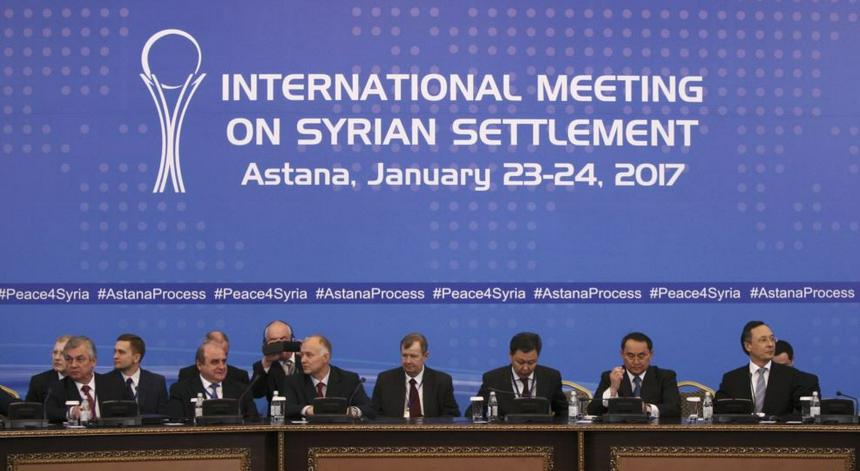
Kazakhstan has hosted 17 rounds of the Astana process meetings on Syria since January 2017 to facilitate UN efforts to resolve the Syrian conflict. Photo credit: REUTERS.
Contribution to resolution of conflicts
Kazakhstan has hosted 17 rounds of the Astana process meetings on Syria since January 2017 to facilitate UN efforts to resolve the Syrian conflict. Kazakhstan was also one of the first to repatriate its citizens, primarily children and women, from conflict zones in the Middle East.
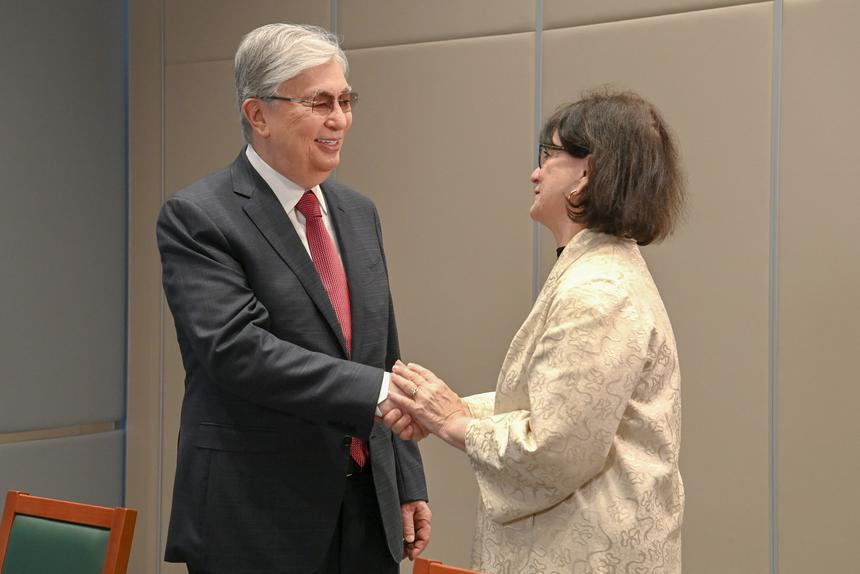
President Tokayev and former Special Representative of the UN Secretary-General and Head of UNAMA Deborah Lyons. Photo credit: Akorda.kz.
The settlement of the situation in Afghanistan is a priority of Kazakhstan’s work at the UN. Humanitarian aid is being regularly provided to the people of Afghanistan, and national and international programs are being implemented to educate Afghan youth, including women, in the educational institutions of Kazakhstan.
After the Taliban seized control of Kabul in August 2021, international personnel of the United Nations Assistance Mission in Afghanistan (UNAMA) and UN agencies, funds, and programs relocated to a temporary office in Almaty. At a meeting with President Tokayev last year, former Special Representative of the UN Secretary-General and Head of UNAMA Deborah Lyons expressed gratitude for the support provided by Kazakhstan to UNAMA.
Other initiatives and important dates
The latest initiative of Kazakhstan was to declare one of the coming years the International Year of Mobilizing Volunteers for Development in recognition of the role of volunteers around the world in the fight against modern challenges and to advance global volunteerism.
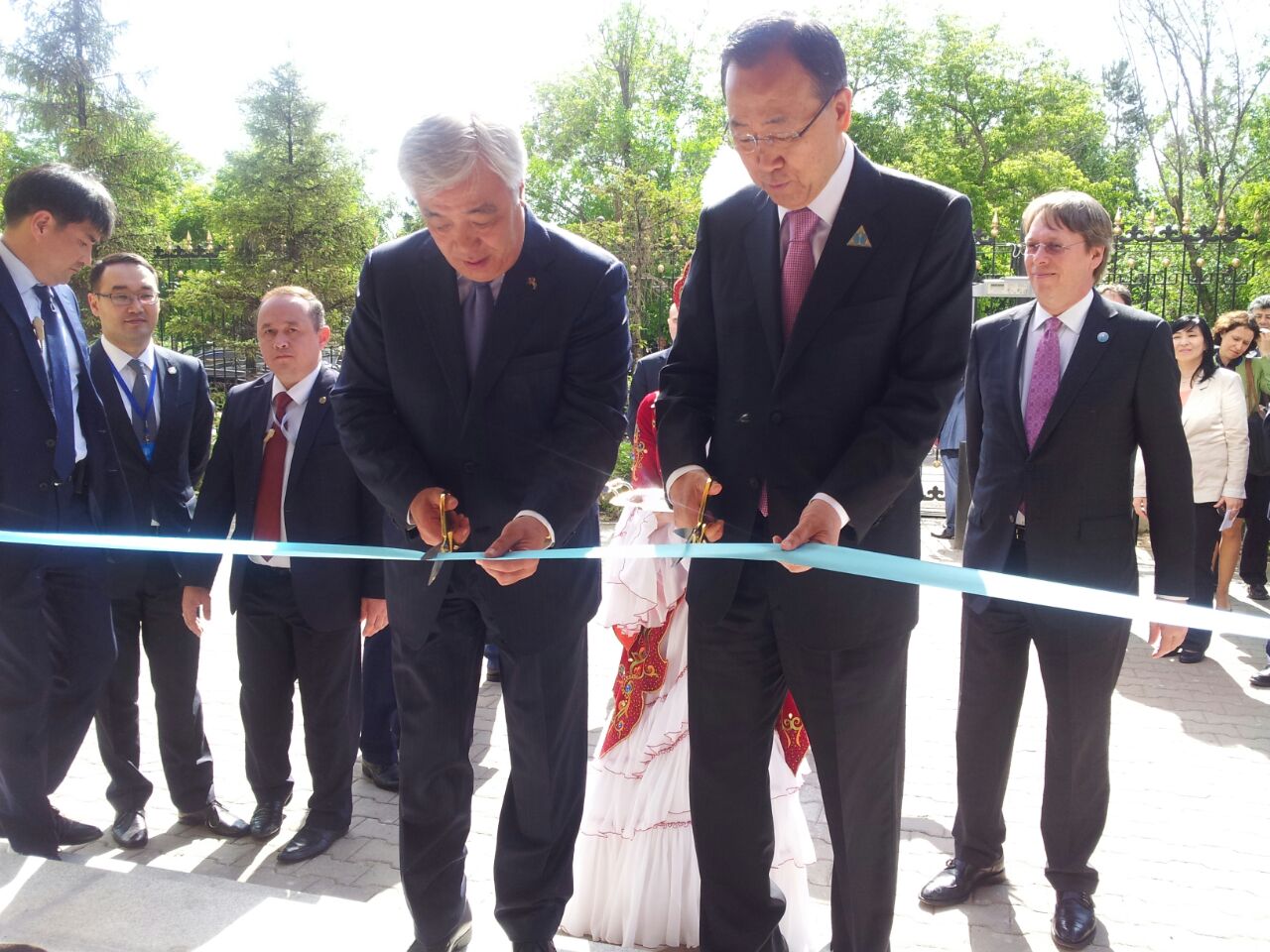
Former Minister of Foreign Affairs Erlan Idrissov and Ban Ki-moon at the opening of the new building of the UN office in Astana in 2015. Photo credit: Tengrinews.
The official visits to Kazakhstan of the UN Secretary-Generals Kofi Annan in 2002, and Ban Ki-moon in 2010 became crucial milestones of cooperation. As Secretary-General of the UN, Ban Ki-moon represented the UN in Astana at the OSCE Summit on Dec. 1-2, 2010 and at the fifth Congress of Leaders of World and Traditional Religions on June 9-10, 2015.
In 2016, the newly elected UN Secretary-General António Guterres, who at the time did not yet assume his mandate, paid a working visit to Kazakhstan. The next year, Guterres visited Astana again to participate in the SCO Council of Heads of State meeting and attended the opening ceremony of EXPO 2017.
In 2016, thanks to the consistent and active work at the UN, Kazakhstan was elected as a non-permanent member of the UN Security Council for 2017-2018. The country became the first from Central Asia to be elected for this role. In 2022, the Permanent Representative of Kazakhstan to the UN was for the first time elected as Chair of the First Committee of the 77th UNGA session.
UN in Kazakhstan
According to the UN Resident Coordinator for Kazakhstan, Michaela Friberg-Storey, Kazakhstan’s membership in the UN has become a “source of inspiration” for others. Thanks to the cooperation between Kazakhstan and the UN, many projects have been implemented over 31 years.
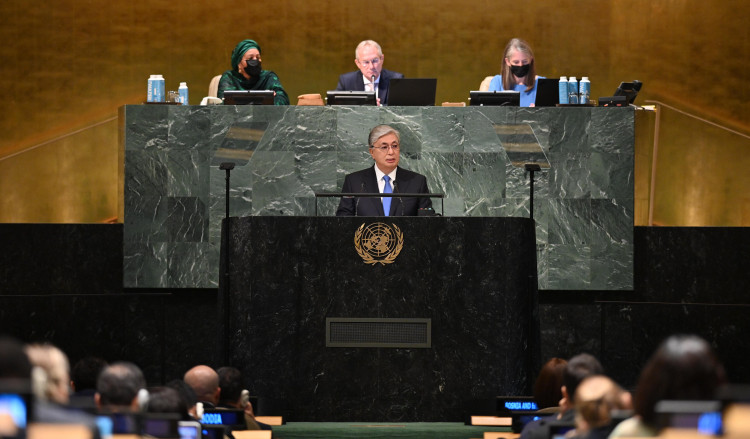
President of Kazakhstan Kassym-Jomart Tokayev at the General Debate of the 77th session of the UN General Assembly on Sept 20, 2022. Photo credit: Akorda.kz.
Since Kazakhstan became a full member, 27 UN agencies have been established; 20 in Kazakhstan and seven outside the country.
“Over the past 30 years, the UN has implemented over 400 national, regional, and local projects in various areas. These include projects on reducing inequality, modernizing institutions, diversifying the economy, managing natural resources, and supporting the most vulnerable communities – children, women, the elderly, people with disabilities, migrants, and refugees,” she said in an interview with the UN News.
The UN has supported more than one million people in biodiversity conservation and land management projects.
“Kazakh farmers and enterprises from 16 regions received support aimed at improving pastoralism, organic and irrigated farming, and water-saving technologies, subsidizing distant pasture cattle breeding and increasing soil fertility and crop diversity,” she noted.
In 2021, the UN General Assembly adopted a resolution on the Aral Sea region, declaring it a zone of ecological innovations and technologies. It was committed to encouraging research and scientific efforts to save the region and improve its environment.
In the same year, Kazakhstan and the UN launched cooperation in the spheres of Human Development and Equal Participation, Effective Institutions, Human Rights and Gender Equality, and Inclusive Economic Growth and Environmental Sustainability.
Last year, Kazakhstan and the UN celebrated the 30th anniversary of their partnership. At the opening of the thematic exhibition, Deputy Foreign Minister Roman Vassilenko noted that Kazakhstan would continue to be a reliable partner of the UN.
In honor of the 30th anniversary of Kazakhstan’s membership in the UN, Kazpost, the UN Mission in Kazakhstan, and the Ministry of Foreign Affairs issued a postage stamp of the Memorable and Anniversary Dates series. Dombra was chosen as the centerpiece for the stamp, emphasizing the importance of the instrument in the history and culture of Kazakhstan. A dombra is also included in the UNESCO Representative List of Intangible Cultural Heritage.
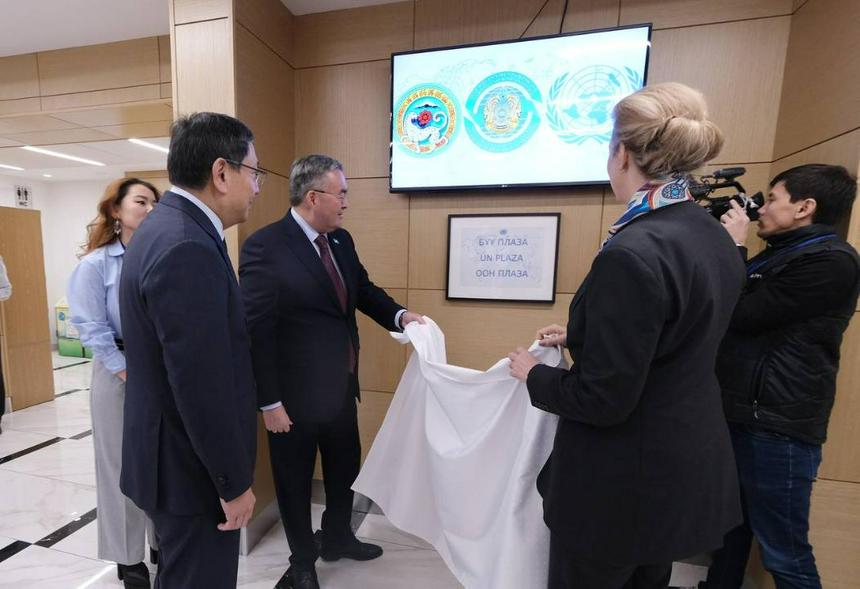
Last year, Kazakhstan and the UN celebrated the 30th anniversary of their partnership at the opening of the thematic exhibition. Photo credit: Ministry of Foreign Affairs.
On Feb. 24, Deputy Prime Minister and Minister of Foreign Affairs of KAzakhstan Mukhtar Tileuberdi, and Mayor of Almaty Yerbolat Dossayev met with the heads of UN agencies and the diplomatic corps and held a ceremony to name the UN building in Almaty “UN Plaza”.
Over the years of its membership in the UN, Kazakhstan has contributed to the peaceful settlement of disputes through preventive diplomacy, dialogue, and negotiations. To this day, our country continues to build a multi-vector balanced foreign policy, fully supporting the work and efforts of the UN to address global international challenges.
Source : Astana Times


